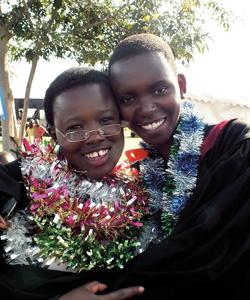Last March, in Muhuru Bay, Kenya, twenty-eight young women from the Women’s Institute for Secondary Education and Research (WISER) were honored as part of the school’s first graduating class. It was an emotional event, a long time in the making.
Founded in 2006 by Sherryl Broverman, associate professor of the practice of biology and global health, and Andy Cunningham ’08, WISER provides a solid secondary education to girls, as well as critical health information. Muhuru Bay, on the shores of Lake Victoria in southwestern Kenya, struggles with high rates of HIV, infant mortality, and poverty.
Educated girls were rare when Broverman first came to the village. “I had some moments of moral outrage of seeing girls sold to their teachers to pay off school fees when they just wanted to study,” Broverman says. “I wanted to do something that could help more than one girl. Right then the girls had several options: They could have sex to stay in school, or they could get married and drop out, or they could run away from their marriage. It seemed to me that there had to be another option.”
Besides educating thirty new girls each year (two girls in this year’s class will graduate next year), WISER has extended its reach to the community by strengthening primary education, building kiosks for clean drinking water, and supporting nutrition through community gardens. The school served as a pilot project for DukeEngage, and Duke students still go there each summer. Broverman has been taking students to Muhuru Bay since 2002 to volunteer in the classroom and the community.
Graduation, which attracted more than 1,000 residents and a handful of Kenyan dignitaries, was a community-wide celebration, and for good reason. In the past thirty years, only one girl in the community had advanced to higher education. In the WISER school, no girls have dropped out. Seventeen members of WISER’s graduating class will be attending college this year—many of them on full scholarships—which means that Muhuru Bay will be sending more girls than boys to college for the first time. Many of them want to pursue careers in medicine and nursing.
“When I first went to Kenya and went to Muhuru Bay, I remember asking girls how many educated women they knew, and they said one,” Broverman says. “Now they can say thirty, and the year after that they can say sixty, and the year after that, ninety. There’s just a whole new idea of what a girl can be in Muhuru Bay.”


Share your comments
Have an account?
Sign in to commentNo Account?
Email the editor